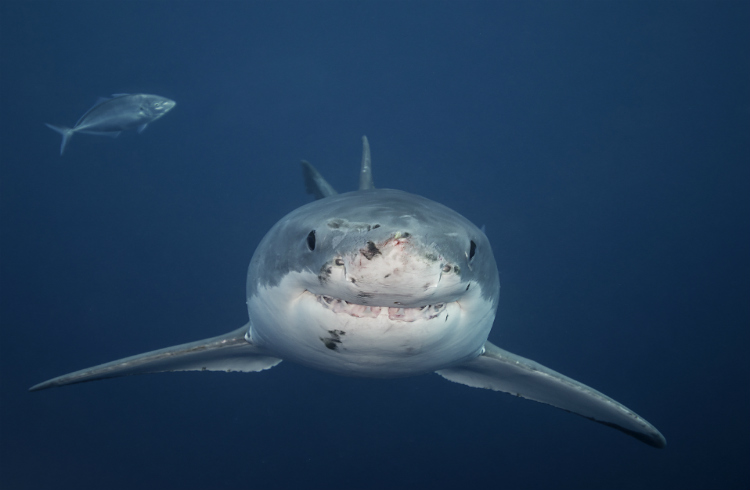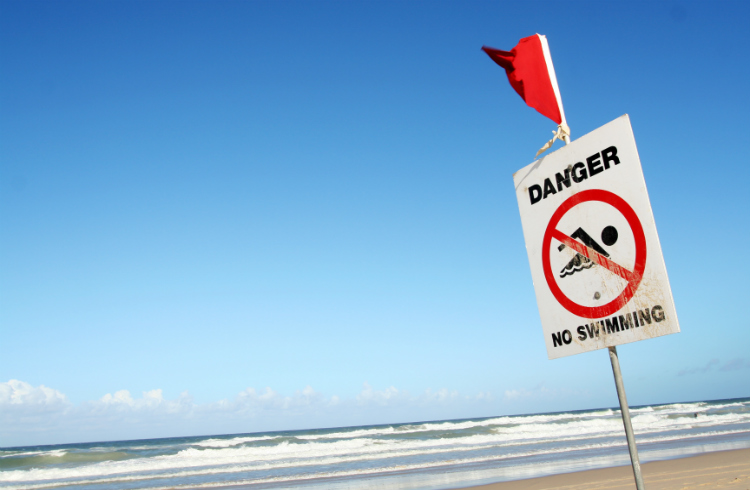Shark Safety in Australia: Should Travelers be Worried?
Is there anything to worry about when you enter the ocean? Find out how to stay shark safe while swimming in Australia. Plus, we bust the myths and sort fact from fiction.
 Photo © Getty Images/by wildestanimal
Photo © Getty Images/by wildestanimal
It's true that Australia has some large predators on land and in the ocean, but let's put things into perspective. Statistically speaking, more people die every year from mosquitos, car accidents, vending machines, or drowning than from a shark bite. More people cop a fatal blow to the head from a flying Champagne cork or a falling coconut!
With 22,293 miles (35,877km) of coastline, it's a point of pride that nearly every Aussie is taught to swim as a kid, and a love of the beach is at the heart of the nation's identity. Most locals are keen swimmers and never encounter a shark up close. But, it's also true that some parts of the coast are more dangerous than others.
Most shark bite incidents are random, unprovoked and a case of mistaken identity, with the shark making an investigatory bite.
Here are the facts, and some handy safety tips, so you can enjoy the water without fear. Be prepared, not paranoid.
- Myths about sharks
- Shark nets and drum lines
- Being shark smart in Australia
- Shark smart apps
- What to do if you see a shark
- Shark bite first aid
6 myths about sharks
Ever since Jaws hit our movie screens in 1975, there has been a continual fear of these apex predators. Here are some of the most common myths.
Myth 1: Sharks are breeding like rabbits and the ocean is overrun with them
Busted: This is biologically impossible. The three species considered dangerous to humans (white, bull and tiger) sexually mature later in life, won't breed every year and will only have a small number of young. Many may not survive due to becoming food for other marine animals, genetics, fishing etc.
Myth 2: Sharks swim close to the shore because we are overfishing the oceans
Busted: While overfishing in our oceans is a major concern, sharks have always swum inshore whether migrating or following food.
Myth 3: Menstruating women shouldn't swim in the ocean
Busted: It takes much more than blood to attract a shark. Keep on swimming, ladies!
Myth 4: You shouldn't swim in the ocean if you have a cut
Busted: While yes, sharks can detect blood in the water, that cut you have is not going to draw them in.
Myth 5: Sharks deliberately go after people
Busted: If this was the case, a lot more than 10 people a year globally would die from shark bites. We aren't on their menu. More people die every year from drowning.
Myth 6: You shouldn't swim when it's dawn or dusk
Busted: Yes, there are many creatures that sharks like to eat at dawn or dusk, but shark bite incidents have also occurred during full daylight hours. Scientists say there is no hard and fast rule as to why an incident might occur at these times as there are many contributing factors.
Shark nets and drum lines
On Australia's east coast, two states operate a government-run shark control program. In NSW, there are nets placed off beaches between Newcastle and Wollongong for six months of the year and in Queensland, nets and drum lines are in place year-round.
Shark nets don't form an enclosure and they don't go from headland to headland. The nets in NSW are only 492ft (150m) long and in QLD, they are 610ft (186m long). Stockton Beach in Newcastle, NSW is a net program beach and it's 19.8 miles (32km) long. Dee Why Beach in Sydney is 1.1 miles (1.8km) long. A 500ft (150m) net off a long beach is akin to whacking a band-aid on a gaping wound when you need stitches and a bandage.
Drum lines, on the other hand, are essentially a baited hook hanging off a buoy which is designed to attract a passing shark. They are spaced out in the water just beyond the surf zone so anything can swim around and between them.
The major downside to these devices, aside from lack of ocean user safety, is the enormous toll they take on marine life. While they may be designed to catch sharks, they also catch turtles, dolphins, rays and other marine animals.
So, don't rely on these devices to keep you safe while in the ocean as there are more common sense things you can do.
How to be shark-smart in Australia
- Always swim at patrolled beaches and between the red and yellow flags; a shark alarm will sound if a shark is sighted and lifesavers will evacuate swimmers and surfers
- Don't swim too far from the beach; this will isolate you and make it harder for you to leave the water
- Swim in a group, not alone
- Avoid swimming when it's dark
- Avoid murky water, river mouths or spots where there is discharge e.g sewerage
- Avoid areas where there is recreational or commercial fishing. Fish offcuts and bait are enticing appetizers for fish and sharks
- Avoid areas with signs of bait fish (bait balls) or fish feeding activity – seabirds will often dive if there is baitfish present
- Don't rely on sightings of dolphins as a sign of safety. Sharks and dolphins will often feed together on the same food
- Take caution when swimming in water between sandbars or near steep drop-offs; these are known hangouts for sharks
- Avoid swimming or surfing near a whale carcass. More often than not, there will be a shark or sharks in the vicinity
- If the beach is closed because of a shark sighting, it's closed. Don't disobey any warning signage or directives from authorities.

Shark smart apps
The New South Wales (NSW) and Western Australian (WA) Governments have shark smart programs and feeds via Twitter, and NSW has an app. While these are not foolproof (not everyone takes their phone to the beach), they let you know the last time a shark was sighted at a beach, when tagged sharks have passed a listening station and more.
However, it's always best to swim or surf at a patrolled beach where possible so you can ask the lifeguards on duty if there have been any shark sightings before you enter the water.
What to do if you see a shark?
- Calmly leave the water and alert your fellow water users
- Don't harass a shark if you see one
- When paddling or swimming away from a shark, use the smoothest stroke you can muster in the situation. Panic will attract the shark
- Alert other people on the beach, especially the lifeguards if they're present so they can sound the alarm.
Shark bite first aid
Most people survive a shark bite incident because of the presence of immediate first aid and advancements in medical treatment.
Blood loss is the biggest factor in fatal shark bite incidents and applying immediate first aid can help buy time until professional medical help arrives, hopefully saving a life.
Once the patient is out of the water:
- If at a patrolled beach, immediately get the attention of lifeguards who can apply emergency first aid and contact an ambulance
- If you aren't at a patrolled beach, or it's outside patrol hours, and you need emergency medical help or witness someone who does, call 000 (or 112) immediately and ask for an ambulance
- Lay the patient in a flat position on a solid surface. If you have access to an arterial tourniquet, apply it at least an inch above the wound. If you don't have access to a tourniquet, apply continuous pressure to the wound site
- Remain calm and, if treating someone, keep them as calm as possible and maintain their body temperature with clothing or towels (or a space blanket if possible).
Simple and flexible travel insurance
You can buy at home or while traveling, and claim online from anywhere in the world. With 150+ adventure activities covered and 24/7 emergency assistance.
Get a quote